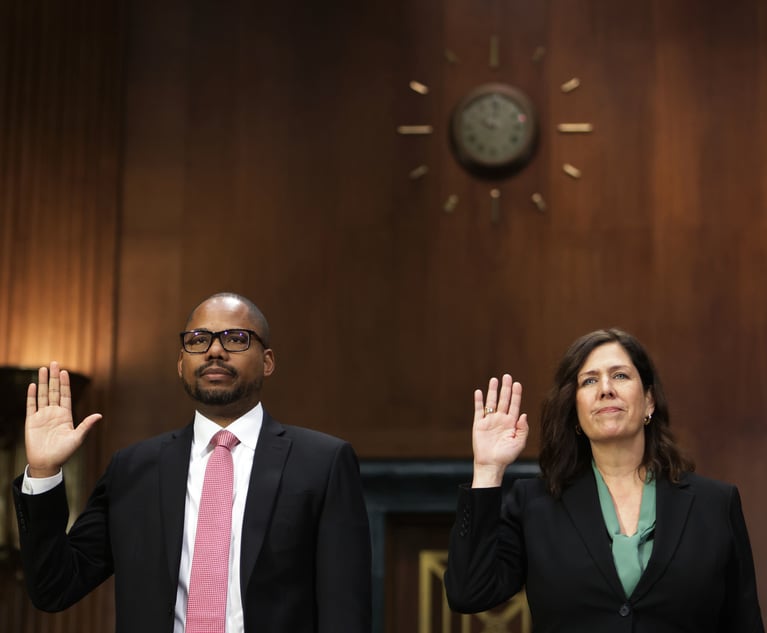 Video screenshot of Georgia state Sen. Jennifer Jordan, D-Atlanta, testifying in Washington, D.C., against Senate Bill 160, which would outlaw abortions nationwide 20 weeks after conception.
Video screenshot of Georgia state Sen. Jennifer Jordan, D-Atlanta, testifying in Washington, D.C., against Senate Bill 160, which would outlaw abortions nationwide 20 weeks after conception.Georgia State Senator Testifies in Washington on Proposed 20-Week Abortion Ban
“Every one of the women I know has a story. They've lost children. They've wanted children. They've taken care of children. They've birthed children,” Sen. Jen Jordan, D-Atlanta, said. “When we see legislators who really have no idea what that experience is like to try to legislate, you know, it's dumbfounding.”
April 10, 2019 at 03:47 PM
7 minute read
On a panel made up of women both for and against a proposed federal law on abortion, Atlanta lawyer and Democratic state Sen. Jen Jordan testified before the U.S. Senate Judiciary Committee in Washington Tuesday about how Georgia's own restrictions on abortion are affecting women.
“Every one of the women I know has a story. They've lost children. They've wanted children. They've taken care of children. They've birthed children,” Jordan said. “When we see legislators who really have no idea what that experience is like to try to legislate, you know, it's dumbfounding.”
Jordan spoke during a two-hour hearing on a Republican-backed bill that would ban abortion nationwide at 20 weeks of pregnancy.
Jordan said in Georgia—a predominately Republican state—even some Republican woman are “outraged” at what they're seeing from lawmakers.
“Because they know that, at the end of the day, no woman takes any of this lightly. You don't walk into a doctor's office wanting to get a horrible diagnosis,” Jordan said. “I wish they would just trust us to make the right decision with respect to our own lives and our own bodies and our children.”
Jordan became an internet phenomenon after her impassioned speech on the Georgia Senate floor in a lost effort to stop approval of a six-week abortion ban passed by the General Assembly last month. A video of her speech went viral on YouTube. During the speech, she told a deeply personal story of her own grief after eight miscarriages and contended that Georgia's new law could subject women to prosecution and prison not only for seeking an abortion but for losing a pregnancy naturally—and possibly even for lacking access to proper prenatal care.
But the focus of Jordan's remarks Tuesday was a 20-week ban required by state law, which Georgia Gov. Nathan Deal signed into law seven years ago. Current Gov. Brian Kemp campaigned on a pledge to pass the toughest abortion law in the country and immediately kept his promise after taking office in January. Kemp is expected to sign the six-week ban legislation into law any day.
Jordan was part of a panel of five women speaking to the committee now chaired by Sen. Lindsey Graham, R-South Carolina, who sponsored what is titled the “Pain Capable Unborn Children Act.” Graham emphasized the testimony of Dr. Donna Harrison, executive director of the American Association of Pro-Life Obstetricians and Gynecologists. Harrison said a fetus feels pain at 20 weeks and would be given anesthesia separately from the mother for prenatal surgery. Harrison made her points in her testimony, but Graham made them in advance in his introduction, then made them again after in his summary. Also, at the request of Sen. Marsha Blackburn, R-Tennessee, Harrison described in graphic detail what happens in a late-term abortion.
The panel included two additional anti-abortion speakers. Melissa Ohden, founder of the Abortion Survivors Network, told a horror story of how she, while in utero, survived a saline-induced abortion demanded by her grandmother, a nurse, when her 19-year-old mother was 31 weeks pregnant. She said she learned the disturbing truth at age 14, after her adoptive mother used it to try to stop her sister from ending an unintended pregnancy.
Also speaking in favor of restricting abortion was Catherine Glenn Foster, president and CEO of Americans United for Life. Foster said law is needed to “protect pre-born children who feel pain.”
Jordan and one other woman spoke in favor of keeping abortion fully legal. Dr. Valerie Peterson, director of partnership development at Equal Opportunity Schools in Dallas, told a tragic personal story of terminating a pregnancy after learning the baby's brain was fatally malformed. She was 16 weeks pregnant when the devastating diagnosis came. Once she made her difficult decision, she was put on a waiting list that caused a delay of two to three weeks. That bumped her up against the 20-week abortion ban in Texas, so she had to fly to another state for the procedure, she testified. This situation would deny medical care to poor women, she said.
Ranking committee member Sen. Dianne Feinstein, D-California, invited Jordan, who spoke and entered written testimony on the ramifications of Georgia's 20-week ban. Since its passage in 2012, that law “has had a profound and deadly effect” for women, Jordan said.
“Whether that is the intent or not, it is certainly the outcome,” Jordan said. “I have seen it in my rural, South Georgia hometown just as I have seen it in the Atlanta metro area. Currently, it is exceedingly difficult to get an abortion in Georgia, but it is just as difficult to give birth in Georgia. No doubt in part [due] to the 20-week-ban, there are no winning options for many of the women of this state.”
Jordan said half of Georgia counties do not have a single obstetrician-gynecologist. She said 31 of the state's hospital labor and delivery departments have closed over the last 21 years—19 in rural areas. Only 59 of Georgia's 159 counties have a labor and delivery unit. And 17 rural hospitals have closed in the past decade.
“Rural counties and the women that live in them have been the hardest hit,” Jordan said. “And if there is any doubt, since the passage of Georgia's 20-week-ban in 2012, we have seen the maternal mortality rate double in Georgia. I do not believe this is a coincidence.”
As for the new, six-week ban, Jordan said that law—if it were to withstand legal challenges—would only make matters worse for the health of Georgia women and children.
“Although the state of Georgia ranks 50 out of 50 states for maternal mortality, it has not sought to expand access to health care to poor women in rural Georgia. It has now acted to do the opposite,” Jordan said. She noted that House Bill 481 won final passage March 29. What proponents call the Heartbeat Bill “mirrors” legislation already passed in Iowa, Missouri and Tennessee. Kentucky is now debating a similar law.
Jordan said all the “heartbeat bills” share scientific inaccuracies and ban abortion often before a woman discovers she is pregnant.
“It is difficult to fix something that is so wrong from the start. This bill and every other one just like it are patently unconstitutional. It is so by design,” Jordan said. “I don't doubt the conviction of those who believe that abortion bans are necessary. However, a deeply held conviction does not allow one to adopt a view counter to scientific and legal fact.”
She said that, as part of the “personhood movement,” Georgia's new law “attempts to establish that a zygote, an embryo, a fertilized egg at 5.5 weeks has a beating heart. This is simply not true. At the earliest stages of pregnancy, certain embryonic cardiac activity can only be detected with a transvaginal ultrasound.”
On the Georgia Senate floor, she previously pointed out that most of her colleagues would not have had that experience.
Jordan is a partner with Shamp Jordan Woodward in Atlanta. She has represented individuals in actions against predatory lending practices. Recently she defeated an insurance company that had denied coverage for breast cancer treatments. She is a graduate of the University of Georgia School of Law. She clerked for Judge Anthony Alaimo of the U.S. District Court for the Southern District of Georgia.
This content has been archived. It is available through our partners, LexisNexis® and Bloomberg Law.
To view this content, please continue to their sites.
Not a Lexis Subscriber?
Subscribe Now
Not a Bloomberg Law Subscriber?
Subscribe Now
NOT FOR REPRINT
© 2024 ALM Global, LLC, All Rights Reserved. Request academic re-use from www.copyright.com. All other uses, submit a request to [email protected]. For more information visit Asset & Logo Licensing.
You Might Like
View All

Trump's Solicitor General Expected to 'Flip' Prelogar's Positions at Supreme Court

'Radical Left Judges'?: Trump Demands GOP Unity Against Biden's Judicial Picks
4 minute read
Trump's Lawyers Speak Out: 'The President Had the Confidence to Retain Me'
Trending Stories
- 1Call for Nominations: Elite Trial Lawyers 2025
- 2Senate Judiciary Dems Release Report on Supreme Court Ethics
- 3Senate Confirms Last 2 of Biden's California Judicial Nominees
- 4Morrison & Foerster Doles Out Year-End and Special Bonuses, Raises Base Compensation for Associates
- 5Tom Girardi to Surrender to Federal Authorities on Jan. 7
Who Got The Work
Michael G. Bongiorno, Andrew Scott Dulberg and Elizabeth E. Driscoll from Wilmer Cutler Pickering Hale and Dorr have stepped in to represent Symbotic Inc., an A.I.-enabled technology platform that focuses on increasing supply chain efficiency, and other defendants in a pending shareholder derivative lawsuit. The case, filed Oct. 2 in Massachusetts District Court by the Brown Law Firm on behalf of Stephen Austen, accuses certain officers and directors of misleading investors in regard to Symbotic's potential for margin growth by failing to disclose that the company was not equipped to timely deploy its systems or manage expenses through project delays. The case, assigned to U.S. District Judge Nathaniel M. Gorton, is 1:24-cv-12522, Austen v. Cohen et al.
Who Got The Work
Edmund Polubinski and Marie Killmond of Davis Polk & Wardwell have entered appearances for data platform software development company MongoDB and other defendants in a pending shareholder derivative lawsuit. The action, filed Oct. 7 in New York Southern District Court by the Brown Law Firm, accuses the company's directors and/or officers of falsely expressing confidence in the company’s restructuring of its sales incentive plan and downplaying the severity of decreases in its upfront commitments. The case is 1:24-cv-07594, Roy v. Ittycheria et al.
Who Got The Work
Amy O. Bruchs and Kurt F. Ellison of Michael Best & Friedrich have entered appearances for Epic Systems Corp. in a pending employment discrimination lawsuit. The suit was filed Sept. 7 in Wisconsin Western District Court by Levine Eisberner LLC and Siri & Glimstad on behalf of a project manager who claims that he was wrongfully terminated after applying for a religious exemption to the defendant's COVID-19 vaccine mandate. The case, assigned to U.S. Magistrate Judge Anita Marie Boor, is 3:24-cv-00630, Secker, Nathan v. Epic Systems Corporation.
Who Got The Work
David X. Sullivan, Thomas J. Finn and Gregory A. Hall from McCarter & English have entered appearances for Sunrun Installation Services in a pending civil rights lawsuit. The complaint was filed Sept. 4 in Connecticut District Court by attorney Robert M. Berke on behalf of former employee George Edward Steins, who was arrested and charged with employing an unregistered home improvement salesperson. The complaint alleges that had Sunrun informed the Connecticut Department of Consumer Protection that the plaintiff's employment had ended in 2017 and that he no longer held Sunrun's home improvement contractor license, he would not have been hit with charges, which were dismissed in May 2024. The case, assigned to U.S. District Judge Jeffrey A. Meyer, is 3:24-cv-01423, Steins v. Sunrun, Inc. et al.
Who Got The Work
Greenberg Traurig shareholder Joshua L. Raskin has entered an appearance for boohoo.com UK Ltd. in a pending patent infringement lawsuit. The suit, filed Sept. 3 in Texas Eastern District Court by Rozier Hardt McDonough on behalf of Alto Dynamics, asserts five patents related to an online shopping platform. The case, assigned to U.S. District Judge Rodney Gilstrap, is 2:24-cv-00719, Alto Dynamics, LLC v. boohoo.com UK Limited.
Featured Firms
Law Offices of Gary Martin Hays & Associates, P.C.
(470) 294-1674
Law Offices of Mark E. Salomone
(857) 444-6468
Smith & Hassler
(713) 739-1250






